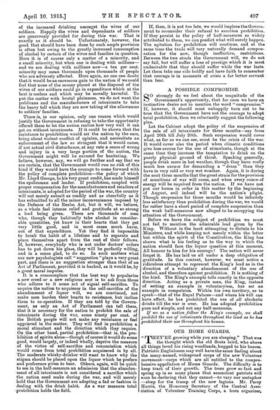A POSSIBLE COMPROMISE.
0 strongly do we feel about the magnitude of the Government's opportunity, that for once we have an instinctive desire not to mention the word "compromise." If, however, it should most unhappily turn out to be true that the Government have not the courage to adopt total prohibition, then we reluctantly suggest the following plan.
Let the Cabinet adopt the policy of the suspension of the sale of all intoxicants for three months—say from April 20th till July 20th. Such suspension would cover what, aa far as we can see, must be the crisis of the war. It would cover also the period when climatic conditions give less excuse for the use of stimulants, though at the same time they increase the temptation to drink on the purely physical ground of thirst. Speaking generally, people drink more in hot weather, though they have really much less excuse for demanding a " dram " than they have in very cold or very wet weather. Again, it is during the next three months that the great strain for the provision of munitions of war will come, and when every ounce of energy will be required from the nation. If we have not put our house in order in this matter by the beginning of August, evil indeed will be the nation's plight. Though suspension for three months would be infinitely less satisfactory than prohibition during the war, we would far rather have a short period of complete suspension than the weak half-measures now alleged to be occupying the attention of the Government.
Before we leave the subject of prohibition we must not fail to mention the admirable lead given by the King. Without in the least attempting to dictate to Iiia Ministers, and while keeping not merely within the letter but within the spirit of the Constitution, the King has shown what is his feeling as to the way in which the nation should face the liquor question at this moment. All honour to him for his courage ! The nation will never forget it. He has laid us all under a deep obligation of gratitude. In this context, however, we must notice a ridiculous attempt to represent the King's lead as in the direction of a voluntary abandonment of the use of alcohol, and therefore against prohibition. It is nothing of the kind. The King's example tells exactly in the opposite direction. Acting as a. private man, the King, instead of setting an example in voluntaryism, has set an example in compulsion. Within his own territory, so to speak—that of the Royal Palaces—and where his will can have effect, he has prohibited the use of all alcoholic drinks till the war is over. He has adopted prohibition pure and simple, and not any half-measures.
If we as a nation follow the King's example, we okra prohibit the use of intoxicants throughout the land as he has prohibited their use throughout his houses,






































 Previous page
Previous page